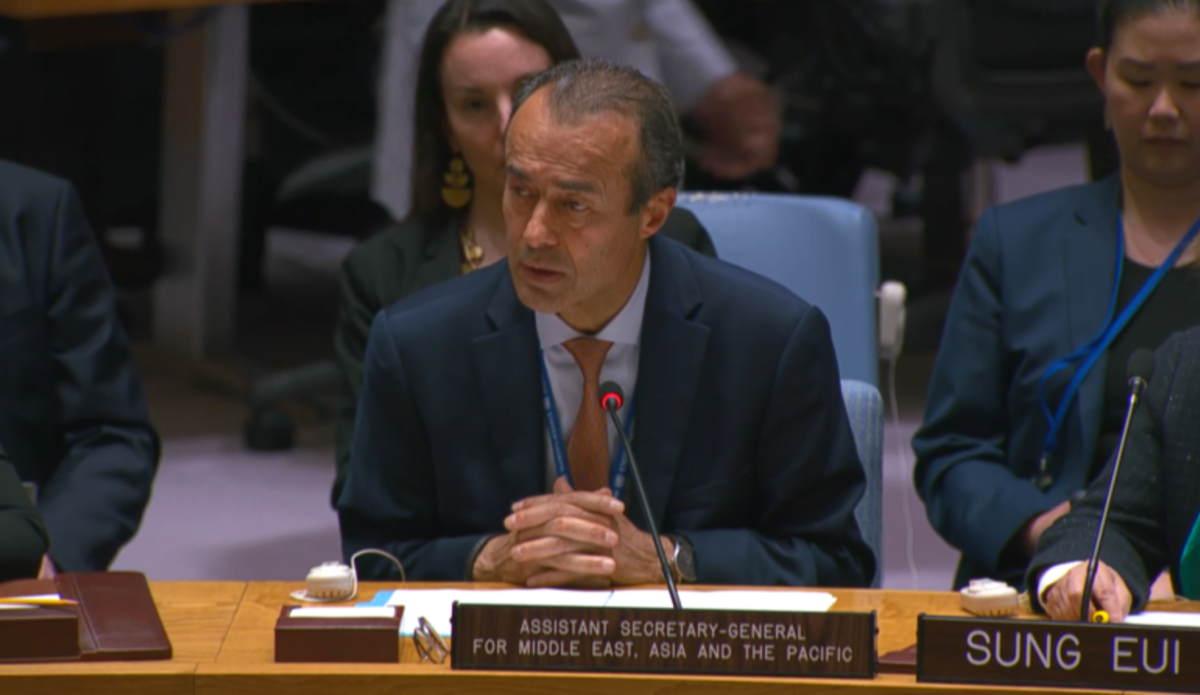Remarks by Mr. Khaled Khiari, Assistant Secretary-General,
Departments of Political and Peacebuilding Affairs and Peace Operations
REMARKS TO THE SECURITY COUNCIL ON THE IMPLEMENTATION OF THE
UN SECURITY COUNCIL RESOLUTION 2474 (2019)
New York, 15 May 2025
Mr. President,
Thank you for the opportunity to brief the Security Council on this important issue.
Since the adoption of the Security Council resolution 2474 in 2019, the number of people affected by armed conflict, including those reported missing in this context has only continued to increase. In 2024 alone, the ICRC registered 56,000 new cases of missing persons.
There is no comprehensive figure for those missing in conflict, but we know enough that the situation is dire.
International humanitarian law, as it relates to missing persons, prohibits enforced disappearance and requires parties to conflict to take all feasible measures to account for those reported missing, while also enshrining the right of families to get information about the fate of missing kin.
This issue is a pressing one among many current situations across the world.
The ongoing hostilities between Israel and Palestinian armed groups continue to generate grave concerns under Security Council resolution 2474 (2019).
We welcome the recent release of Edan Alexander, an American-Israeli national who had been held hostage in Gaza. This is a source of hope. I echo the Secretary-General’s words of profound relief that Mr. Alexander was able to return to his family and loved ones after this harrowing ordeal.
However, many more remain missing. An estimated 58 Israeli hostages, 35 of them presumed dead, still remain unaccounted for in Gaza.
Despite repeated calls by the United Nations and the International Committee of the Red Cross, no credible information has been provided on the condition or whereabouts of the hostages. Access by impartial humanitarian actors has also been denied.
Meanwhile, thousands of Palestinians, including children, also remain missing, with many buried and unaccounted for under rubble, with their families still seeking information about their fate and whereabouts.
In addition, Israel continues to withhold the remains of deceased Palestinians, including individuals reportedly buried in unmarked or numbered graves, hindering families’ access to information and closure.
Serious concerns also persist regarding thousands of Palestinians detained by Israeli authorities since October 2023, many of whom remain unaccounted for.
In Ukraine, following Russia’s full-scale invasion in 2022, OHCHR reports that large numbers of Ukrainian civilians in areas under Russian occupation have faced detention, with some of them reportedly held incommunicado. According to OHCHR, some of these cases may amount to enforced disappearances. An unspecified number of Ukrainian civilians, including Ukrainian children, have also been reportedly transferred to the Russian Federation.
We welcome the recent exchanges of prisoners of war and exchanges of mortal remains and encourage the sides to step up the frequency, scope, and scale of such exchanges and step up efforts to enable the safe return of Ukrainian children to their families.
In Myanmar, instances of individuals believed to be missing or disappeared have arisen throughout the country since the 2021 military takeover. At least 2,000 people have reportedly died while in military custody. A key concern remains the lack of access to legal counsel and due process for some people detained arbitrarily, including members of the elected civilian government.
Families of many of those that have gone missing in conflicts in years and decades past have yet to learn of the whereabouts of their loved ones.
On the Korean Peninsula, we encourage all parties to build on previous efforts and continue the repatriation of remains from the Korean War to their respective countries.
In Syria, the missing persons crisis has been a tragically defining feature of the conflict. Syrian families have made it clear that clarifying the fate of all the missing, regardless of who they are and why they disappeared, is essential to transitional justice and sustainable peace. Given the scale and complexity of the challenge, we need a collective effort. It has to be nationally led and internationally supported. The UN welcomes the commitment of the Syrian interim authorities and urges them to work closely with the Independent Institution on Missing Persons in the Syrian Arab Republic.
Mr. President,
Disappearances of loved ones create long term trauma on families and communities.
Providing answers for the families of the missing can take decades. For example, the human cost of the 1991 Gulf War still lingers, with 315 Kuwaiti and third country nationals missing to this day.
The work of the Committee on Missing Persons in Cyprus illustrates how the issue of missing persons remains important not only for the families directly affected, but for whole communities, decades after the facts. This is clearly not unique to Cyprus. What is more unique is the continuous support of the authorities – which was reaffirmed publicly by both Cypriot leaders in April – and the existing good cooperation from both side when it comes to the work of the Committee built overtime. These, together with the strong professional capacity of the bicommunal teams working in the field or in the laboratory, are the key ingredients for success. Success that also helps to build conducive conditions for the peaceful settlement of the Cyprus issue.
Mr. President,
When the issue of missing persons is left unaddressed, not only individuals but entire societies are unable to move on. This can perpetuate distrust and resentment and become an obstacle to sustainable peace.
Goodwill, perseverance, and strong international support are crucial elements in the search for missing persons. So is respect for international law.
Resolution 2474 must be fully implemented, with urgency.
The United Nations remains committed to assist all concerned parties, including through the use of the Secretary-General’s good offices.
Thank you Mr. President.

